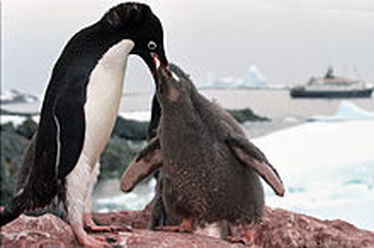English/Language Arts
Explore lead sentences - leading with a question
Add this Minute to the list of Minutes that start out with a question. Do a quick search for “question leads” on the Nonfiction Minute page to get a list of others and have students look at several to compare and contrast. Can your students develop some guidelines about when question leads are especially effective? Have them take a simple encyclopedia entry and see of they can rewrite it by starting out with a question. Does it add interest? Voice?
Explore vocabulary in context
Author Whiting uses some vocabulary in this Minute that younger students will not necessary have heard before. Look at words like plumage and juvenile and ask students if they can define them as a stand-alone. Now ask them to find the words in the Minute and see if they have a better understanding. Ask why they think this might be? This is an exercise you can do frequently. Rather than telling them that using context to discover meaning is a strategy that works, set up your questioning to allow them to discover it on their own.
Social Studies
Explore geography
Use this Minute to revisit geographical features including continents, oceans and peninsulas. Have students use globes and world maps to find these features. How far would it be for your students to visit penguins in Antarctica from their hometown? Use the maps and find out!
STEM
Explore the food chain
Use this Minute to look at the food chain in Antarctica. Where are the plants? How does this look like the food chains where we live? What are the similarities and differences?
Explore Animal adaptations
Penguins are flightless - an anomaly for their animal class - and many live in one of the most inhospitable biomes (for humans, at least) on the planet. Have your students take a closer look at these birds and figure out how they have adapted to their environment over time. What reasons could there be that these birds are only found in the Southern hemisphere? Look at other flightless birds. Are any found in the Northern hemisphere? Why or why not?
Health & Wellness
Explore growth and development
Author Whiting gives us a fun way to start the discussion of human growth and development by giving the reader a peek into the growth and development of these adorable birds. Use this opportunity to map out developmental stages and find parallels and divergence between student and penguin developmental stages!
Research Skills
Explore dedicated ‘days’
Who decides that April 25th is World Penguin Day? Did you know there is also a Penguin Awareness Day set aside in January? What is the origin of these? Send your students searching for the origin stories behind these two ‘dedicated’ days and find out who is really making these kinds of decisions. What world organization might dedicate these kinds of days? Do they come and go? Take a closer look.
Explore lead sentences - leading with a question
Add this Minute to the list of Minutes that start out with a question. Do a quick search for “question leads” on the Nonfiction Minute page to get a list of others and have students look at several to compare and contrast. Can your students develop some guidelines about when question leads are especially effective? Have them take a simple encyclopedia entry and see of they can rewrite it by starting out with a question. Does it add interest? Voice?
Explore vocabulary in context
Author Whiting uses some vocabulary in this Minute that younger students will not necessary have heard before. Look at words like plumage and juvenile and ask students if they can define them as a stand-alone. Now ask them to find the words in the Minute and see if they have a better understanding. Ask why they think this might be? This is an exercise you can do frequently. Rather than telling them that using context to discover meaning is a strategy that works, set up your questioning to allow them to discover it on their own.
Social Studies
Explore geography
Use this Minute to revisit geographical features including continents, oceans and peninsulas. Have students use globes and world maps to find these features. How far would it be for your students to visit penguins in Antarctica from their hometown? Use the maps and find out!
STEM
Explore the food chain
Use this Minute to look at the food chain in Antarctica. Where are the plants? How does this look like the food chains where we live? What are the similarities and differences?
Explore Animal adaptations
Penguins are flightless - an anomaly for their animal class - and many live in one of the most inhospitable biomes (for humans, at least) on the planet. Have your students take a closer look at these birds and figure out how they have adapted to their environment over time. What reasons could there be that these birds are only found in the Southern hemisphere? Look at other flightless birds. Are any found in the Northern hemisphere? Why or why not?
Health & Wellness
Explore growth and development
Author Whiting gives us a fun way to start the discussion of human growth and development by giving the reader a peek into the growth and development of these adorable birds. Use this opportunity to map out developmental stages and find parallels and divergence between student and penguin developmental stages!
Research Skills
Explore dedicated ‘days’
Who decides that April 25th is World Penguin Day? Did you know there is also a Penguin Awareness Day set aside in January? What is the origin of these? Send your students searching for the origin stories behind these two ‘dedicated’ days and find out who is really making these kinds of decisions. What world organization might dedicate these kinds of days? Do they come and go? Take a closer look.
© Karen Sterling, 2018 - May be used for educational purposes without written permission



